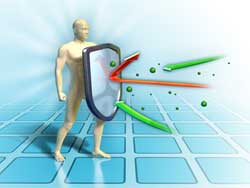




Medical Cuisine - Vitamins and Minerals

|
The human body requires vitamins and minerals to grow and function properly
|
|
Nearly all the vitamins and minerals ( essential nutrients ) we humans require can be found in our food and water. Our planet abounds with amazing foods, and nearly all food is different in its structure, taste and chemistry.
|
|
Certain vitamins and minerals are considered essential because without them our bodies wont and don’t develop and function properly. Our age, our environment, genetic makeup, lifestyle (work, sport, alcohol consumption etc) can determine how much of the essential nutrients (vitamins and minerals) we need.
The human body requires different levels of vitamins and minerals over its life cycle. Folate for example is recommended in larger amounts for maintaining optimal health of unborn babies, and also said to be needed in larger amounts for women to even conceive. |

|
Vitamin A
|
Vitamin C
|
Vitamin D
|
Vitamin E
|
Vitamin K
|
|
Vitamin B1
|
Vitamin B2
|
Vitamin B3
|
Vitamin B5
|
Vitamin B6
|
|
Vitamin B7
|
Vitamin B9
|
Vitamin B12
|
Vitamins are essential nutrients. Other nutrients include carbohydrates, protein, fat, minerals and water. Nutrients are the nutritional components in foods that an organism utilises to survive and grow.
Vitamins are essential for the healthy maintenance of cells, tissues, and organs. They enable us to use chemical energy that comes from food, and to help process the proteins, carbohydrates, and fats required for nutrition and ongoing life support.
Most of the vitamins we need are obtained from food, but there are exceptions. Very few foods contain vitamin D. The major natural source of vitamin D (specifically cholecalciferol) is synthesized in the skin with the help of the sun. This so-called “sunshine vitamin” is essential for our health but, sometimes the cure can be worse than the condition. To much sun can destroy our skin and actually endanger our health.
Vitamin supplementation is important for the treatment of certain health problems, but many studies have suggested there is little evidence of nutritional benefit when used by healthy people.
Caution should be taken when taking vitamin supplements, megadoses or taking more than our body requires can damage our organs and body systems. High doses of vitamin supplements can also conflict with prescription drugs that many of us depend on.
Eating a normal, well-balanced diet will not lead to vitamin toxicity in healthy individuals.
Vitamins from food are accompanied by many other substances that provide nutritional support for the body, our understanding of food has come a long way but, there is much research to be done in learning all the chemical processes of substances which occur within living organisms.
Eating a well balanced diet with all food groups in the best and safest option to give our body the nutrition we need.
There are a total of nine water-soluble vitamins, these include;
|
Vitamin C
|
Ascorbic acid
|
|
Vitamin B1
|
Thiamine or Thiamin, named as the “thio-vitamine” (“sulfur-containing vitamin”).
|
|
Vitamin B2
|
Riboflavin
|
|
Vitamin B3
|
Niacin or Nicotinic acid
|
|
Vitamin B5
|
Pantothenic acid, also called pantothenate
|
|
Vitamin B6
|
Seven forms of vitamin B6 are known
Pyridoxine (PN), the form most commonly given as vitamin B6 supplement Pyridoxine 5′-phosphate (PNP) Pyridoxal (PL) Pyridoxal 5′-phosphate (PLP), the metabolically active form (sold as ‘P-5-P’ vitamin supplement) Pyridoxamine (PM) Pyridoxamine 5′-phosphate (PMP) 4-Pyridoxic acid (PA), the catabolite which is excreted in the urine |
|
Vitamin B7
|
Biotin, also known as vitamin H or coenzyme R
|
|
Vitamin B9
|
Folic acid or folate. It is also referred to as vitamin M, vitamin Bc (or folacin), pteroyl-L-glutamic acid, and pteroyl-L-glutamate.
|
|
Vitamin B12
|
also called cobalamin
|
Fat-soluble vitamins include;
|
Vitamin A
|
Vitamin A is a group of unsaturated nutritional organic compounds, that includes retinol, retinal, retinoic acid, and several provitamin A carotenoids, among which beta-carotene is the most important. [1]
|
|
Vitamin D
|
Vitamin D refers to a group of fat-soluble secosteroids responsible for enhancing intestinal absorption of calcium, iron, magnesium, phosphate and zinc. In humans, the most important compounds in this group are vitamin D3 (also known as cholecalciferol) and vitamin D2 (ergocalciferol). Cholecalciferol and ergocalciferol can be ingested from the diet and from supplements. Very few foods contain vitamin D; synthesis of vitamin D (specifically cholecalciferol) in the skin is the major natural source of the vitamin. Dermal synthesis of vitamin D from cholesterol is dependent on sun exposure (specifically UVB radiation). [2]
|
|
Vitamin E
|
Vitamin E refers to a group of compounds that include both tocopherols and tocotrienols. Of the many different forms of vitamin E, γ-tocopherol is the most common in the North American diet. γ-Tocopherol can be found in corn oil, soybean oil, margarine, and dressings. α-tocopherol, the most biologically active form of vitamin E, is the second-most common form of vitamin E in the diet. This variant can be found most abundantly in wheat germ oil, sunflower, and safflower oils. [3]
|
|
Vitamin K
|
Vitamin K refers to a group of structurally similar, fat-soluble vitamins the human body needs for complete synthesis of certain proteins that are required for blood coagulation, and also certain proteins that the body uses to manipulate binding of calcium in bone and other tissues. [4]
|
|
Sulfur
|
Potassium
|
Chlorine
|
Sodium
|
Calcium
|
|
Phosphorus
|
Magnesium
|
Zinc
|
Iron
|
Manganese
|
|
Copper
|
Iodine
|
Selenium
|
Molybdenum
|
Cobalt
|
|
Bromine
|
Many elements have been suggested as essential, but such claims have usually not been confirmed. One problem with identifying the efficacy of some minerals is that some elements are innocuous (not harmful or offensive) at low concentrations (examples: silicon and nickel in solid and dust), so proof of efficacy is lacking because deficiencies are difficult to reproduce. [5]
Mineral Facts
Minerals are essential nutrients. The others include carbohydrates, protein, fat, vitamins and water. Nutrients are the nutritional components in foods that an organism utilises to survive and grow.
Minerals are important for your body to stay healthy. Your body uses minerals for many different jobs, including building bones, making hormones and regulating your heartbeat.
Essential minerals that our bodies need, are sometimes devided into two groups, as seen below;
- Major minerals (macrominerals) and,
- Trace minerals (microminerals).
Macrominerals include;
|
Sodium
|
Chloride
|
Potassium
|
Calcium
|
Phosphorus
|
|
Magnesium
|
Sulfur
|
Microminerals include;
|
Zinc
|
Iron
|
Manganese
|
Copper
|
Iodine
|
|
Selenium
|
Molybdenum
|
Cobalt
|
Bromine
|
|
|
|
|
|
||||||||||
|
||||||||||
